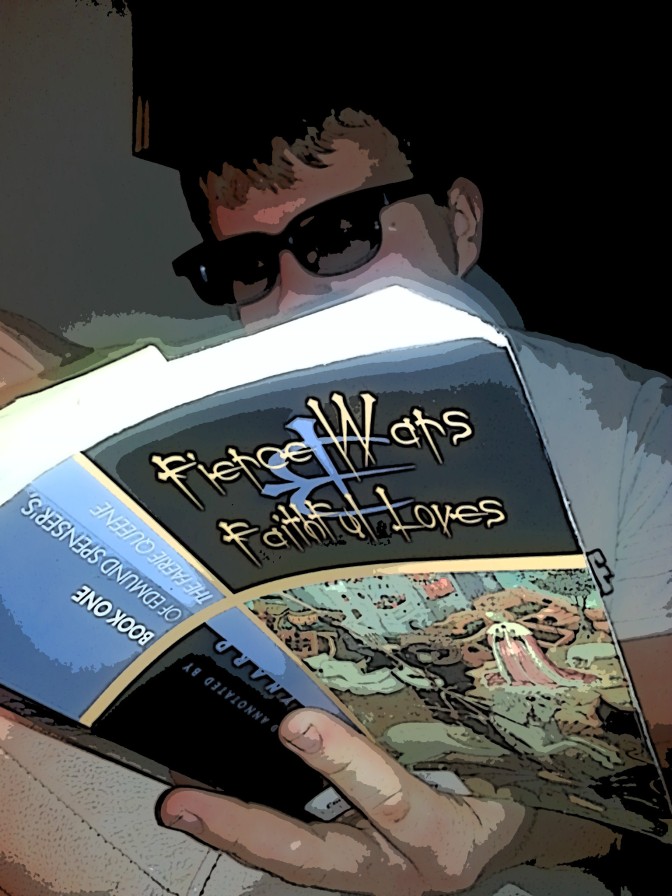 “Each one should use whatever gift he has received to serve others, faithfully administering God’s grace in its various forms” (1 Peter 4:10 NIV).
“Each one should use whatever gift he has received to serve others, faithfully administering God’s grace in its various forms” (1 Peter 4:10 NIV).
Buried well within this blog post is the heart of the matter: pride. It is a subtle form of pride that squelches the talents I believe God wants me to share. It took an epic poem, written in the 1500s, and an ugly club-bearing giant to knock some sense into me.
sssssssssssssssssssssssssssssssssssssssssssssssssssssssssssssssssssssssssssssssssssss
It is a blessed student who gets to suffer through Edmund Spenser’s Faerie Queene. It is an even more blessed student who gets to teach it. That would be me.
This latest round of teaching Spenser’s text has touched my heart deeply. The author has become my teacher once again.
Ten years ago, when I was searching for appropriate books to teach my 11th and 12th grade English students in our classical, Christ-centered school, my colleagues recommended The Faerie Queene. I had never heard of it. As they spoke, I pictured “The Fairy Queen,” as in “happily ever after” fairy tales, princesses and princes, fairies, and fantasy. This is not that book. Instead it an epic poem, twelve cantos encompassing 233 pages, written in English so old it takes footnotes and side definitions to make sense of it. The awkwardly spelled title tells it all. Add to the title the fact that Spenser was a contemporary of William Shakespeare—and that Shakespeare is much easier to read—and you can get a sense of its difficulty.
To sell it to students, I emphasize that it contains damsels in distress and in control, knights in shining armor, witches, wizards, monsters, elves and beasts. (I’d like to say it contains zombies and vampires to really hook my students, but that would be a lie.) The story is an allegory portraying a Christian seeking sanctification.
So some students read, some students read SparkNotes, some students pretend to read, and some students don’t even do that much. One of my students told me, “This book was stupid!” and seemed pleased with the 48 percent he earned on the test. I was not pleased for him.
What did please me, however, was a deeper consideration of the minor character Orgoglio, a giant who represents “subtle pride,” according to Roy Maynard, the editor of the version of Faerie Queene Book 1 that I insist my students read.
Orgoglio appears immediately after the protagonist Redcross Knight experiences a less-than-holy moment. Spenser describes Orgoglio as “an hideous Giant horrible and high” whose “stature did exceed the height of three the tallest sons of mortal seed.” The giant then takes the “disarmed, disgraced, and inwardly dismayed” Redcross, nearly kills him with his club (an oak tree), and puts him in his dungeon.
The word orgoglio means “pride” in Italian, but, according to Maynard’s footnote, Orgoglio “doesn’t symbolize the overt sort of pride,” rather he represents something “more sinister.” Maynard gives an example:
“Today I find myself beginning to boast about something I’ve done. But I catch myself. I’m happy I’ve stopped myself from displaying pride. In fact, I’m proud of myself for not displaying pride. See what I mean? Just when you think you have pride beat, it returns in a more dangerous form.”
When we discussed that in class, my students seem to understand that subtle form of pride—and we all chuckled at how it was represented in such a large way. I think we all interpreted “subtle” as small, not as gigantic and powerful.
But as I headed for church the following Sunday I thought of another example of subtle pride. I was experiencing it in the form of insecurity that seemed gigantic. That morning, I had actually employed an old voice lesson cassette tape to warm up my voice for helping lead worship at church. I love to sing, but sometimes I am afraid my voice isn’t right for a certain song or isn’t mixing right with the other singers, and so I hold back. The week before I had suffered that insecurity more than usual and was determined to be as prepared as possible.
My mind was filled with thoughts of Orgoglio and the subtle pride he represented—and I realized that my “insecurity” was really a form of subtle pride too. Why am I insecure? I put myself on stage with other singers thinking that I can sing well—and then fear I will miss a note, come in at the wrong time, or some other self-doubt. That is fear of failure, and that is due to pride—because I don’t want to be embarrassed or exposed or pinpointed as less than talented. Insecurity is pride, though I tell myself it is something more godly than that. I’ve likened my “insecurity” to humility highlighted in this parable that Jesus shared:
“When someone invites you to a wedding feast, do not take the place of honor, for a person more distinguished than you may have been invited. If so, the host who invited both of you will come and say to you, ‘Give this person your seat.’ Then, humiliated, you will have to take the least important place. But when you are invited, take the lowest place, so that when your host comes, he will say to you, ‘Friend, move up to a better place.’ Then you will be honored in the presence of all the other guests. For all those who exalt themselves will be humbled, and those who humble themselves will be exalted” (Luke 14:8-11).
It’s one thing to take a back seat at a banquet and wait for an invitation to a better table; it’s quite another to hold back a talent in hopes of being invited into using it more. Yet, that’s what I’ve done. I’ve allowed my “insecurity” (subtle pride) to affect what I do with my singing—and my writing, as well. Yes, I regularly (or mostly regularly) write blog posts—but I don’t put myself out in public any more than writing my blog. I want readership. I want “likes.” I want comments. I want to be discovered. I truly believe—usually—that what I have to say is important because God has given me a talent and a message. But my “insecurity” in writing makes me wait to be discovered—instead of taking steps to get more public notice or to solicit other venues in which I could share my talents.
Those are just two examples from my life that I believe represent “subtle pride” hiding in insecurity. This insecurity, this subtle pride isn’t the desired humility Jesus depicted in Luke. Instead, this insecurity squelches the talents God has given me. The Apostle Paul writes in 1 Peter that:
“Each one should use whatever gift he has received to serve others, faithfully administering God’s grace in its various forms” (4:10 NIV).
Rather than wholeheartedly using my gifts to serve others and administer God’s grace, I have been holding back, trapped in insecurity, the subtle pride that induces a fear of failure. Yes, I sing. Yes, I write. But do I do so with reckless abandonment knowing that I am obeying God’s call to share what God has given me? I must be obedient, giving my all and leaving the results to Him. I must obey with service—not insecure self—in mind.
(That reckless abandonment I so desire to express reminds me of the movie, “Chariots of Fire,” that depicts the Olympic runner Eric Liddell. In it he says, “I believe God made me for a purpose, but he also made me fast. And when I run I feel His pleasure.” When I sing, when I write, I want to feel God’s pleasure.)
In Spenser’s Faerie Queene, the Redcross Knight is only released from his prison by the grace of Jesus Christ (present as the character Prince Arthur). Arthur first kills the giant (sorry, should have given a spoiler alert), then searches for the knight in the various dungeons before finding him and raising him out of the pit.
Before he departs, Arthur says to Redcross, who is physically weakened and depressed by his failures:
“The things that grievous were to do, or bear,
Them to renew, I wote, breeds no delight.
Best music breeds delight in loathing ear.
But the only good, that grows of passed fear,
Is to be wise, and wary of like again” (Canto VII, Stanza 44, The Faerie Queene Book 1).
(Now, perhaps, you can see why some students shun Spenser’s work but why I love to teach it. Its wording is somewhat archaic but its message so powerful.)
In simpler terms, Arthur encourages Redcross to learn from past mistakes but not dwell on them. And so must I.
sssssssssssssssssssssssssssssssssssssssssssssssssssssssssssssssssssssssssssssssssssss
I started writing this post two weeks ago and struggled through its writing. Some posts are like that. I find it ironic that as I contemplated completing this post yesterday morning, I came across the NaBloPoMo (National Blog Posting Month) challenge and took it. By the grace of God, I fight the subtle pride evidenced by my insecurity by determining to go all out in using my talents to bring God glory.
Keep reading, my friends. I will write.

